Related Research Articles
Madan Mohan Kohli, better known as Madan Mohan, was an Indian music director of the 1950s, 1960s and the 1970s. He is considered one of the most melodious and skilled music directors of the Hindi film industry. He is particularly remembered for the immortal ghazals he composed for Hindi films. Some of his best works are with singers Lata Mangeshkar, Mohammed Rafi and Talat Mahmood.

Do Raaste is a 1969 Indian Hindi film directed by Raj Khosla. It stars Rajesh Khanna as the dutiful son and Mumtaz as his love interest. Balraj Sahni and Kamini Kaushal play the eldest son and his wife. Prem Chopra plays the wayward son with Bindu as his wife who creates disputes.

Anpadh is a 1962 Hindi film. It stars Balraj Sahni, Dharmendra, Mala Sinha, Shashikala. Actress Bindu made her first prominent appearance in this film with the song Jiya Le Gayo Ji Mora Sanwariya. The music is by Madan Mohan and the lyrics by Raja Mehdi Ali Khan. The film focuses on the importance of education for girls. This movie has the evergreen song "Aapki Nazron Ne Samjha", sung by Lata Mangeshkar.
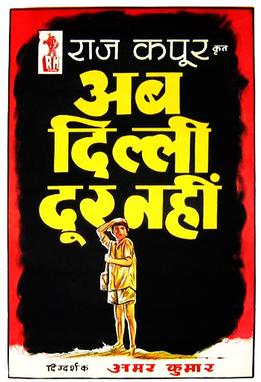
Ab Dilli Dur Nahin is a 1957 Indian Hindi-language film directed by Amar Kumar and written by Rajinder Singh Bedi and Muhafiz Hyder. The film was produced by Raj Kapoor and starred Yakub, Anwar Hussain, Motilal, Jagdeep and Amjad Khan.

Ganga Ki Lahren is a 1964 Hindi drama film produced and directed by Devi Sharma. The film stars Kishore Kumar, Dharmendra, Savitri, Aruna Irani, Rehman and Asit Sen. The music of the film is by Chitragupt, with lyrics by Majrooh Sultanpuri, featuring songs like "Ganga Ki Lahren".

Lootmaar is a 1980 Indian Hindi mystery film produced and directed by Dev Anand. The film stars Dev Anand, Tina Munim, Mehmood, Nirupa Roy, Prem Chopra, Ranjeet, Shakti Kapoor, Kader Khan, Amjad Khan, Simple Kapadia, Shreeram Lagoo, and Rakhee Gulzar. The film's music was composed by Rajesh Roshan.

Aap Ki Parchhaiyan is a 1964 Bollywood film. Produced and directed by Mohan Kumar, the film stars Dharmendra, Shashikala, Supriya Choudhury, Om Prakash and Manorama. The film's music is by Madan Mohan. A couple of songs; "Main nigahen tere chehre se hataaoon kaise", by Mohd. Rafi and "Agar mujhse mohabbat hai" by Lata Mangeshkar are plus points of this family drama.
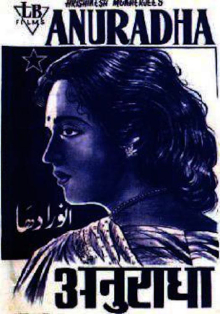
Anuradha is a 1960 Hindi-language Indian film produced and directed by Hrishikesh Mukherjee. The film stars Balraj Sahni and Leela Naidu in lead roles along with Asit Sen and Mukri. The film is noted for being Miss India Naidu's debut film.

Rajinder Singh Bedi was an Indian Urdu writer of the progressive writers' movement and a playwright, who later worked in Hindi cinema as a film director, screenwriter and dialogue writer and he is grandfather to Rajat Bedi and Manek Bedi.
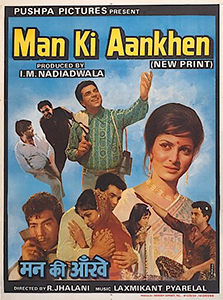
Man Ki Aankhen is 1970 Indian Hindi language film directed by Raghunath Jhalani.
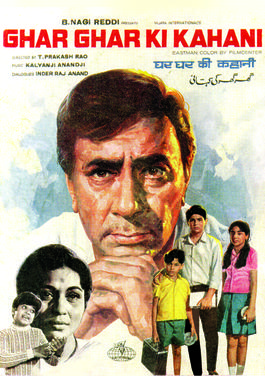
Ghar Ghar Ki Kahani is a 1970 Hindi-language drama film directed by T. Prakash Rao. The film stars Balraj Sahni, Nirupa Roy and Om Prakash in lead roles, supported by Rakesh Roshan, Bharathi, Shashikala and others.The remake and adaptation rights of this film are now owned by Glamour Eyes Films.
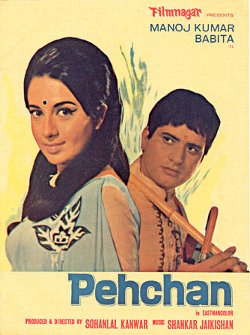
Pehchan is a 1970 Filmfare Award winning Bollywood romance film produced & directed by Sohanlal Kanwar and story by Sachin Bhowmick. The film stars Manoj Kumar, Babita, and Balraj Sahni with music by Shankar Jaikishan.
Pandit Amarnath was an Indian Classical Vocalist and film music composer. He composed music for the film Garam Coat in 1955. He should not be confused with the very popular composer of the same name, Amarnath, who was very active in Lahore and Mumbai film industry.

Bhabhi Ki Chudiyan is a 1961 Hindi-language drama film directed by Sadashiv J. Row Kavi, starring Meena Kumari and Balraj Sahni. It is a remake of the 1953 Marathi film Vahinichya Bangdya.
Naunihal is a 1967 Indian Hindi-language drama film directed by Raj Marbros starring Sanjeev Kumar, Balraj Sahni and Indrani Mukherjee in lead roles. The film's music was composed by Madan Mohan, with lyrics by Kaifi Azmi, including the song "Meri Aawaz Suno Pyar ka Raaz Suno" sung by Mohammad Rafi. The song is picturized over the funeral procession of Prime Minister of India, Jawahar Lal Nehru.

Bhai-Bhai (transl. Brothers) is a 1956 Indian Hindi-language drama film directed by M. V. Raman for A. V. M. Productions. It had screenplay by Javar Seetharaman, with Hindi screen adaptation of the Tamil film Ratha Paasam directed by C.V. Sridhar. The music director was Madan Mohan, with dialogues and lyrics written by Rajendra Krishan. One of the popular songs from the film was "Ae Dil Mujhe Bata De", sung by Geeta Dutt, "in an unabrasive fast tempo". The song became one of Madan Mohan's earliest hits, and the music of the film in journalist-author Bharatan's words, went on to "conquer the box office".

Pinjre Ke Panchhi is a 1966 Indian Hindi-language film starring Meena Kumari, Balraj Sahni and Mehmood in lead roles. The film marks the directorial debut of ace music director Salil Chowdhury who also gave its music. It was a commercial failure at the box office.

Chand is a 1959 Indian Hindi-language film starring Meena Kumari, Balraj Sahni, Pandari Bai and Manoj Kumar in lead roles. The film is directed by Lekhraj Bhakri and its music is given by Hemant Kumar.

Satta Bazaar is a 1959 Indian Hindi-language film starring Meena Kumari and Balraj Sahni in lead roles. The music of the film was composed by Kalyanji Anandji.
References
- ↑ Anustup Basu (2010). Bollywood in the Age of New Media: The Geo-televisual Aesthetic. Oxford University Press. pp. 1960–. ISBN 978-0-7486-8676-6.
- ↑ Ashish Rajadhyaksha; Paul Willemen (2014). Encyclopedia of Indian Cinema. Taylor & Francis. pp. 1994–. ISBN 978-1-135-94325-7.
- ↑ Bhaskar Sarkar (29 April 2009). Mourning the Nation: Indian Cinema in the Wake of Partition. Duke University Press. pp. 98–. ISBN 978-0-8223-9221-7.
- ↑ Kohli, Suresh (4 June 2010). "Garam Coat (1955)". The Hindu . Retrieved 25 August 2014.
- ↑ AVIJIT GHOSH (2013). 40 RETAKES. Westland. pp. 45–. ISBN 978-93-83260-31-7.[ permanent dead link ]
- ↑ "Best Story Official listings". Indiatimes, Filmfare Awards. Archived from the original on 29 April 2014. Retrieved 25 August 2014.